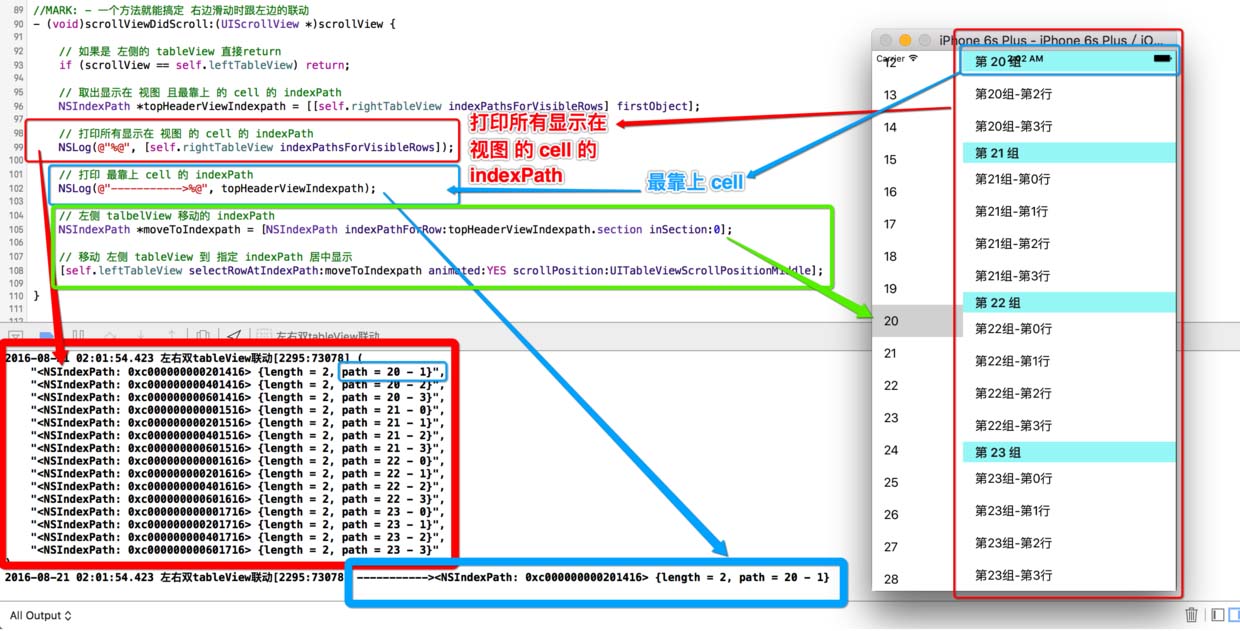
二、小解析,可以先看看后面的!

三、实现 tableView联动 主要分两种状况
1、点击 左侧 cell 让右侧 tableView 滚到对应位置
2、滑动 右侧 tableView 让左侧 tableView 滚到对应位置
1.先实现简单的:点击 左侧 cell 让右侧 tableView 滚到对应位置
//MARK: - 点击 cell 的代理方法- (void)tableView:(UITableView *)tableView didSelectRowAtIndexPath:(NSIndexPath *)indexPath { // 判断是否为 左侧 的 tableView if (tableView == self.leftTableView) {// 计算出 右侧 tableView 将要 滚动的 位置NSIndexPath *moveToIndexPath = [NSIndexPath indexPathForRow:0 inSection:indexPath.row];// 将右侧 tableView 移动到指定位置[self.rightTableView selectRowAtIndexPath:moveToIndexPath animated:YES scrollPosition:UITableViewScrollPositionTop];// 取消选中效果[self.rightTableView deselectRowAtIndexPath:moveToIndexPath animated:YES]; }}左侧 按钮点击的联动 搞定![self.rightTableView indexPathsForVisibleRows] 返回 所有显示在界面的 cell 的 indexPath//MARK: - 一个方法就能搞定 右边滑动时跟左边的联动- (void)scrollViewDidScroll:(UIScrollView *)scrollView { // 如果是 左侧的 tableView 直接return if (scrollView == self.leftTableView) return; // 取出显示在 视图 且最靠上 的 cell 的 indexPath NSIndexPath *topHeaderViewIndexpath = [[self.rightTableView indexPathsForVisibleRows] firstObject]; // 左侧 talbelView 移动到的位置 indexPath NSIndexPath *moveToIndexpath = [NSIndexPath indexPathForRow:topHeaderViewIndexpath.section inSection:0]; // 移动 左侧 tableView 到 指定 indexPath 居中显示 [self.leftTableView selectRowAtIndexPath:moveToIndexpath animated:YES scrollPosition:UITableViewScrollPositionMiddle];}第二步 右侧 滑动 跟左侧 的联动 搞定! 对的 就是这么简单!!!#pragma mark - UITableViewDelegate 代理方法 -- (void)tableView:(UITableView *)tableView willDisplayHeaderView:(UIView *)view forSection:(NSInteger)section {//// headerView 将要显示// 这两个方法都不准确}- (void)tableView:(UITableView *)tableView didEndDisplayingHeaderView:(UIView *)view forSection:(NSInteger)section {//// headerView 已经显示// 这两个方法都不准确}五、以下是所有示例代码//// ViewController.m// 左右双tableView联动//// Created by 阿酷 on 16/8/20.// Copyright © 2016年 AkuApp. All rights reserved.//#import "ViewController.h"#define leftTableWidth [UIScreen mainScreen].bounds.size.width * 0.3#define rightTableWidth [UIScreen mainScreen].bounds.size.width * 0.7#define ScreenWidth[UIScreen mainScreen].bounds.size.width#define ScreenHeight [UIScreen mainScreen].bounds.size.height#define leftCellIdentifier @"leftCellIdentifier"#define rightCellIdentifier @"rightCellIdentifier"@interface ViewController () <UITableViewDataSource, UITableViewDelegate>@property (nonatomic, weak) UITableView *leftTableView;@property (nonatomic, weak) UITableView *rightTableView;@end@implementation ViewController- (void)viewDidLoad { [super viewDidLoad]; [self.view addSubview:self.leftTableView]; [self.view addSubview:self.rightTableView];}#pragma mark - tableView 数据源代理方法 -- (NSInteger)tableView:(UITableView *)tableView numberOfRowsInSection:(NSInteger)section { if (tableView == self.leftTableView) return 40; return 8;}- (NSInteger)numberOfSectionsInTableView:(UITableView *)tableView { if (tableView == self.leftTableView) return 1; return 40;}- (UITableViewCell *)tableView:(UITableView *)tableView cellForRowAtIndexPath:(NSIndexPath *)indexPath { UITableViewCell *cell; // 左边的 view if (tableView == self.leftTableView) {cell = [tableView dequeueReusableCellWithIdentifier:leftCellIdentifier forIndexPath:indexPath];cell.textLabel.text = [NSString stringWithFormat:@"%ld", indexPath.row];// 右边的 view } else {cell = [tableView dequeueReusableCellWithIdentifier:rightCellIdentifier forIndexPath:indexPath];cell.textLabel.text = [NSString stringWithFormat:@"第%ld组-第%ld行", indexPath.section, indexPath.row]; } return cell;}- (NSString *)tableView:(UITableView *)tableView titleForHeaderInSection:(NSInteger)section { if (tableView == self.rightTableView) return [NSString stringWithFormat:@"第 %ld 组", section]; return nil;}#pragma mark - UITableViewDelegate 代理方法 -//- (void)tableView:(UITableView *)tableView didEndDisplayingHeaderView:(UIView *)view forSection:(NSInteger)section {//// 这两个方法都不准确//}////- (void)tableView:(UITableView *)tableView willDisplayHeaderView:(UIView *)view forSection:(NSInteger)section {//// 这两个方法都不准确//}//MARK: - 一个方法就能搞定 右边滑动时跟左边的联动- (void)scrollViewDidScroll:(UIScrollView *)scrollView { // 如果是 左侧的 tableView 直接return if (scrollView == self.leftTableView) return; // 取出显示在 视图 且最靠上 的 cell 的 indexPath NSIndexPath *topHeaderViewIndexpath = [[self.rightTableView indexPathsForVisibleRows] firstObject]; // 左侧 talbelView 移动的 indexPath NSIndexPath *moveToIndexpath = [NSIndexPath indexPathForRow:topHeaderViewIndexpath.section inSection:0]; // 移动 左侧 tableView 到 指定 indexPath 居中显示 [self.leftTableView selectRowAtIndexPath:moveToIndexpath animated:YES scrollPosition:UITableViewScrollPositionMiddle];}//MARK: - 点击 cell 的代理方法- (void)tableView:(UITableView *)tableView didSelectRowAtIndexPath:(NSIndexPath *)indexPath { // 选中 左侧 的 tableView if (tableView == self.leftTableView) {NSIndexPath *moveToIndexPath = [NSIndexPath indexPathForRow:0 inSection:indexPath.row];// 将右侧 tableView 移动到指定位置[self.rightTableView selectRowAtIndexPath:moveToIndexPath animated:YES scrollPosition:UITableViewScrollPositionTop];// 取消选中效果[self.rightTableView deselectRowAtIndexPath:moveToIndexPath animated:YES]; }}#pragma mark - 懒加载 tableView -// MARK: - 左边的 tableView- (UITableView *)leftTableView { if (!_leftTableView) {UITableView *tableView = [[UITableView alloc] initWithFrame:CGRectMake(0, 0, leftTableWidth, ScreenHeight)];[self.view addSubview:tableView];_leftTableView = tableView;tableView.dataSource = self;tableView.delegate = self;[tableView registerClass:[UITableViewCell class] forCellReuseIdentifier:leftCellIdentifier];tableView.backgroundColor = [UIColor redColor];tableView.tableFooterView = [[UIView alloc] init]; } return _leftTableView;}// MARK: - 右边的 tableView- (UITableView *)rightTableView { if (!_rightTableView) {UITableView *tableView = [[UITableView alloc] initWithFrame:CGRectMake(leftTableWidth, 0, rightTableWidth, ScreenHeight)];[self.view addSubview:tableView];_rightTableView = tableView;tableView.dataSource = self;tableView.delegate = self;[tableView registerClass:[UITableViewCell class] forCellReuseIdentifier:rightCellIdentifier];tableView.backgroundColor = [UIColor cyanColor];tableView.tableFooterView = [[UIView alloc] init]; } return _rightTableView;}@end六、总结